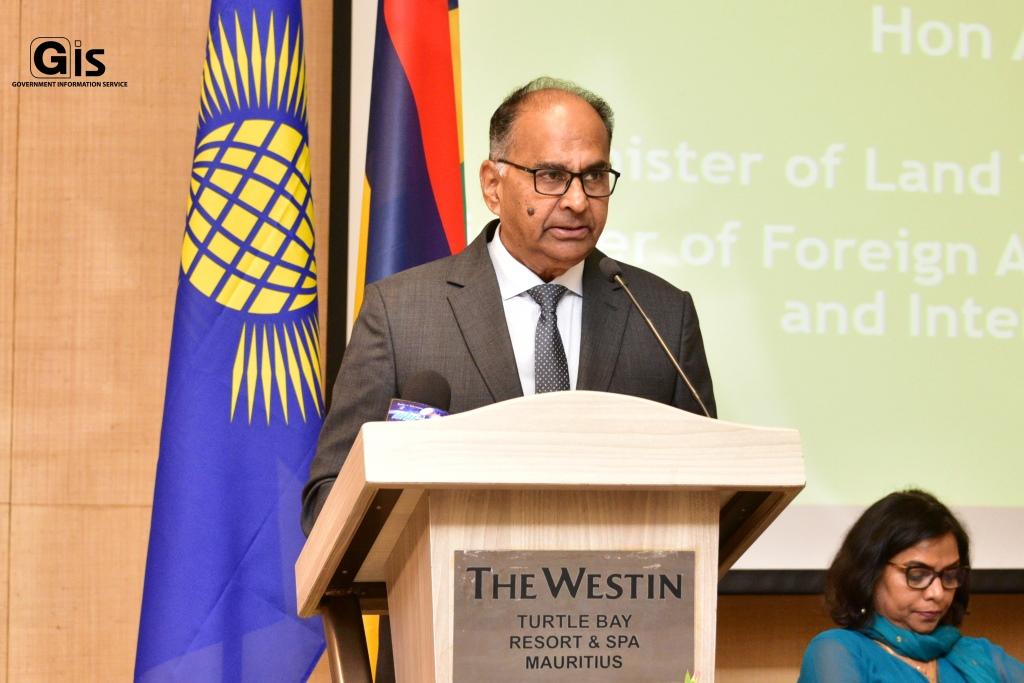
Africa-Press – Mauritius. Small Island Developing States (SIDS) are at the forefront of the climate crisis as they are highly exposed and vulnerable to climate variability and change and with the onslaught of the devastating COVID-19 pandemic and the Russia-Ukraine crisis, the economies of a great majority of SIDS are hanging in the balance as they now face a crisis of financial liquidity and multi-dimensional vulnerability which needs urgent resolution.
In short, access to financing is needed now. This call for action was made, this morning, by the Minister of Land Transport and Light Rail, Minister of Foreign Affairs, Regional Integration and International Trade, Mr Alan Ganoo, during the opening of the fifth Steering Committee of the Commonwealth Climate Finance Access Hub (CCFAH) held at Westin Turtle Bay Resort and Spa, Balaclava.
The Secretary General of the Commonwealth, Mrs. Patricia Scotland, was also present. In his keynote address, Minister Ganoo underlined the urgency to address the impact of climate change and the need for adequate and timely access to affordable finance for climate action.
He recalled that the COVID-19 crisis has constrained the financial resources of SIDS and is expected to have significant implications for adaptation. Funds previously earmarked for adaptation projects may have been diverted to COVID-19 responses, and rapidly changing priorities disrupt adaptation planning and implementation processes, he said.
SIDS, Minister Ganoo remarked, will be affected by climate change impacts and their economies, societies, and systems will have to build sufficient resilience to not only survive but also thrive and keep reaching for their development goals and priorities.
He however deplored that SIDS have to confront the burdensome and uncoordinated bureaucratic processes of most climate funds which unfairly places them at a disadvantage due to human and technical capacity constraints to develop and implement high quality and impactful climate action-related projects.
He therefore called for a dedicated funding mechanism which will also build national institutional capacity. According to him, the establishment of a SIDS fund or a SIDS dedicated window within existing funds is one of the preferred options for addressing the shortcomings of the current climate finance architecture.
A dedicated direct access funding envelope will facilitate access through increased ownership and alignment with countries’ priorities and needs. It will also strongly contribute to build robust country systems and strengthen institutional capacity, he said.
He underscored that access to affordable international finance remains a key enabler for the implementation of resilience building strategies. He added that it will complement sustainable recovery post-pandemic efforts, all converging toward helping SIDS achieve their sustainable development goals.
Speaking about the CCFAH, Minister Ganoo highlighted that this flagship project allows Member States to plough through the international finance system and climate action funds and make a successful bid for climate finance.
Acknowledging that the Hub is still in its early stages, he observed that it has made remarkable achievements since its establishment in 2016. He further noted that whilst the CCFAH offers commendable support to secure funding for bankable climate-related projects, it cannot be the only conduit for climate finance.
He added that it is imperative to rethink how international financing, including innovating financing support for adaptation and mitigation is delivered and transferred in a process of shifting away from project-based approaches toward programme approaches focused on building long-term capacity in SIDS and their transition to inclusive, resilient green economies.
For her part, Secretary-General Patricia Scotland stated that the climate challenge has never been greater especially against the backdrop of the post pandemic economic downturn and recovery efforts and the global political landscape including the Russia-Ukraine war.
Hence the importance to reflect and push forward on the effective service delivery of the CCFAH as we look ahead to the upcoming Climate Change Conference in Egypt-COP 27 and beyond, she said.
She rejoiced that despite the challenges over the last years, the Hub has grown in leaps and bounds, evolving, adapting and learning to achieve great results for the benefit of Member States such as the mobilisation of over 50 million US Dollars’ worth of climate finance.
She also recalled that Australia will contribute two million Australian Dollars to the Hub over the next two years. Earlier today, the Mrs. Patricia Scotland paid a courtesy call on Minister Ganoo at the Westin Turtle Bay Resort and Spa. The overall objective of the Steering Committee is to exercise oversight on the operations of the CCFAH.
Some of the specific objectives for the fifth Steering Committee meeting include: providing strategic and policy guidance to the operations of the CCFAH; monitoring and assessing the overall performance of the CCFAH in line with its overall goals and objectives; supporting the Commonwealth Secretariat in resource mobilisation to help achieve the financial sustainability for the operations of the CCFAH; and reviewing and advising on regional and international partnership proposals for the CCFAH.
The CCFAH The CCFAH was established in 2016 following the Heads of Government Meeting (CHOGM) held in Malta in 2015. The decision to establish CCFAH followed the realisation that SIDS and Least Developed Countries are mostly vulnerable to the impacts of climate change due to their limited financial, human, institutional and technological capacities to respond.
There was therefore a need to establish a mechanism that could assist them with these challenges particularly in addressing capacity constraints hampering the small and other vulnerable countries from accessing climate finance to support climate action.
The CCFAH, with the central hub hosted by the Government of Mauritius in Port Louis, was therefore established as a mechanism aimed at assisting small and vulnerable states to access climate finance. In executing its mandate, CCFAH functions through a Steering Committee that is tasked with exercising oversight on its operations.
For More News And Analysis About Mauritius Follow Africa-Press






